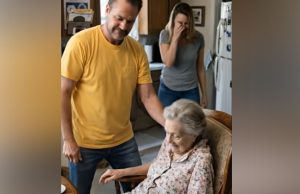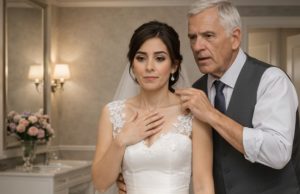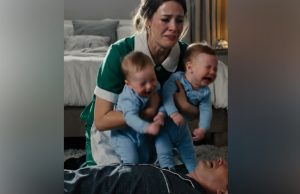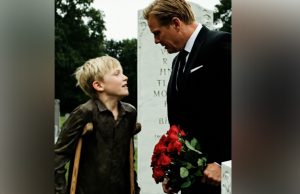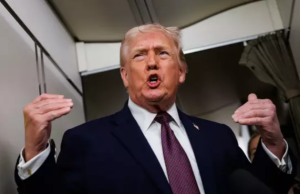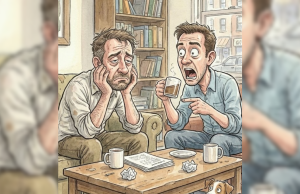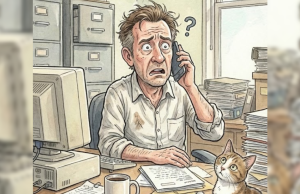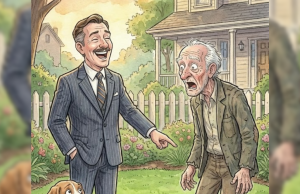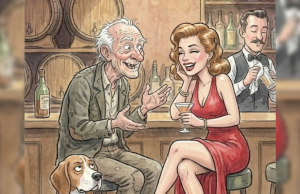
Had anyone suggested to Alexander Harrington that a scruffy boy wearing a torn shirt and a toy stethoscope would shatter the walls he’d built around his life, he would’ve laughed—probably with a cruel quip to match.
But that’s exactly how it started.
Alexander despised parks—especially on Sundays. And this one? He hated it more than most. The noise, the sticky-sweet scent of popcorn, the unpredictable chaos of children zipping too close to his wheelchair—it all grated on him like sandpaper.
Their laughter, their movement, their freedom—everything he no longer had—set his teeth on edge. He sat motionless beneath the stretched limbs of a sycamore tree, cloaked not in serenity, but in dominance. His security team had cleared a wide perimeter—no one came within twenty meters.
It had been five long years since the stroke. His left side was useless, and the right was deteriorating fast. But his mind remained sharp, and his tongue even sharper. He couldn’t move, but he could still slice people open with a single sentence—and he often did.
“What’s this nonsense supposed to be?” he sneered, glaring at a group of children.
“We’re doctors!” a girl with bright pigtails and a toy clipboard declared cheerfully. “We’re saving lives!”
“Saving?” he shot back with icy disdain. “Everyone dies. Especially if you treat people as badly as you dress.”
The laughter died. Some kids backed away. One whimpered. But a single boy didn’t budge. He was small, bareheaded, and carried a seriousness far beyond his age. A red toy stethoscope hung from his neck, but he clutched it like it was real.
“Do you want to get better?” the boy asked, locking eyes with Alexander.
“You?” Alexander chuckled bitterly. “The best hospitals in the world couldn’t help me. You think you can—for a cookie?”
“No,” the boy replied calmly. “For a million dollars. If you walk after I treat you, you pay. If not—nothing.”
Alexander stared, intrigued despite himself. He’d seen conmen, fanatics, and lunatics. But in this boy—Luke, he would later learn—there was something else. A quiet certainty. A stillness too profound for a child.
“And how exactly do you plan to manage that?”
“You have to trust me,” Luke said. “That’s the rule. Let me do my ritual. Don’t laugh. Don’t interrupt. Just… trust.”
Alexander smirked. His bodyguards exchanged wary glances. One leaned in, whispering, “Should we step in, sir?”
“No. Let him try. Let’s see what kind of scam this is. Then we report him.”
Luke pulled a shoebox from his backpack. Inside were bits of ribbon, a small stone, and an old photograph. He carefully laid them on the grass, murmured softly to himself, and moved his hands in slow, deliberate motions. Alexander watched, oddly transfixed.
Then Luke placed his warm hand over Alexander’s. “It’s done,” he said. “Tomorrow you’ll walk. Don’t forget the million.”
Without fanfare, Luke packed up and walked off, vanishing into the trees and crumbling buildings beyond the park.
One of the guards burst out laughing. “Brilliant. Didn’t even try.”
Alexander laughed too—but beneath the chuckle, a strange unease lingered. That night, back in his sleek, sterile smart bed, he slipped into sleep with the same heaviness that usually haunted him.
Then came the pain. But it wasn’t the usual kind. This felt… different. A sharp cramp, maybe?
He blamed the medication—until he looked down.
His right toe twitched. Once. Then again.
He narrowed his focus. Another flicker of movement. It didn’t seem real. He called the nurse. Then the on-call physician. Soon, a full medical team had gathered.
His hands shook—not with the familiar frustration or rage—but with something closer to wonder. Hours later, with help, Alexander stood. Wobbly. Weak. Supported. But for the first time in five years, he was upright.
“This… this shouldn’t be possible,” his neurologist stammered. “Your spinal cord was severed. This has no medical explanation.”
Alexander’s voice was a whisper. “It’s not a miracle. It’s repayment.”
He could still hear Luke’s voice—that quiet certainty. Tomorrow you’ll walk.
And now, he had.
He needed to find the boy who had done what science could not.
That night, he dreamed—not of paralysis or pain—but of running. Legs shaky, lungs burning. Not escaping something… but being followed. A small shadow trailing behind, shaped like a boy.
The next morning, the sunlight barged in through the windows like it owned the place—as if it knew today was different. He didn’t run. But he took ten slow, agonizing steps to his chair. Each one hard-won. Each one real.
Something inside him had shifted. The doctors had no explanation. The scans still showed damage. But something deep within had started to mend. They called it spontaneous neuroregeneration.
A scientific term for something they couldn’t understand.
But Alexander knew the truth.
The next day, he returned to the park. No entourage. No wheelchair. Just a plain gray coat and a cane. He sat on the same bench and waited.
“Where’s the boy?” he asked the playing children. “The one with the red stethoscope. Luke.”
They looked puzzled. Shook their heads. No one remembered.
Still, Alexander came back daily. Reporters began to swarm—his recovery had gone public. But he ignored them. He wasn’t chasing headlines. He was chasing Luke.
One cold afternoon, as leaves danced in the breeze, a ragged man with a smoky coat sat beside him.
“You’re looking for him,” the man said softly.
Alexander narrowed his eyes. “Luke. You know where he is?”
“I’ve seen him. Helped someone—just like you. Last I heard, he was near an old school on the edge of the city. A shelter, maybe. Leaky roof. Forgotten place.”
“Address?” Alexander asked.
The man gave it. Alexander pulled out money. The man declined. “Keep it. It’s good when powerful men search for those who heal, not just those who serve them.”
The place looked abandoned. Graffiti, broken windows, weeds. A faded sign read Scheduled for Demolition. But inside—laughter, voices, life.
He stepped in. The air smelled like soup. And something gentle.
Drawings lined the walls. He first saw her—an elderly woman with a scarf, tired face, kind eyes.
“I’m looking for a boy. Luke.”
She paused. Nodded. “And you’re Mr. Harrington.” He nodded silently.
“He said you’d come.”
“Where is he?”
“Outside. He’ll return.”
She showed him a wall of photos—before-and-afters of homes, families, memories.
He froze at one. His company’s logo.
“These buildings…”
“Yes,” she said. “Torn down for your project. We were displaced. No warning. No help. We didn’t protest. We were tired. But Luke stayed.”
Each word landed like a blade. He remembered the meeting. “Just old folks and immigrants,” someone had said. He hadn’t cared. Until now.
Now, he stood in a fragile shelter—saved not by wealth, but by a child with nothing.
Then Luke appeared. In the doorway. Calm. Serious.
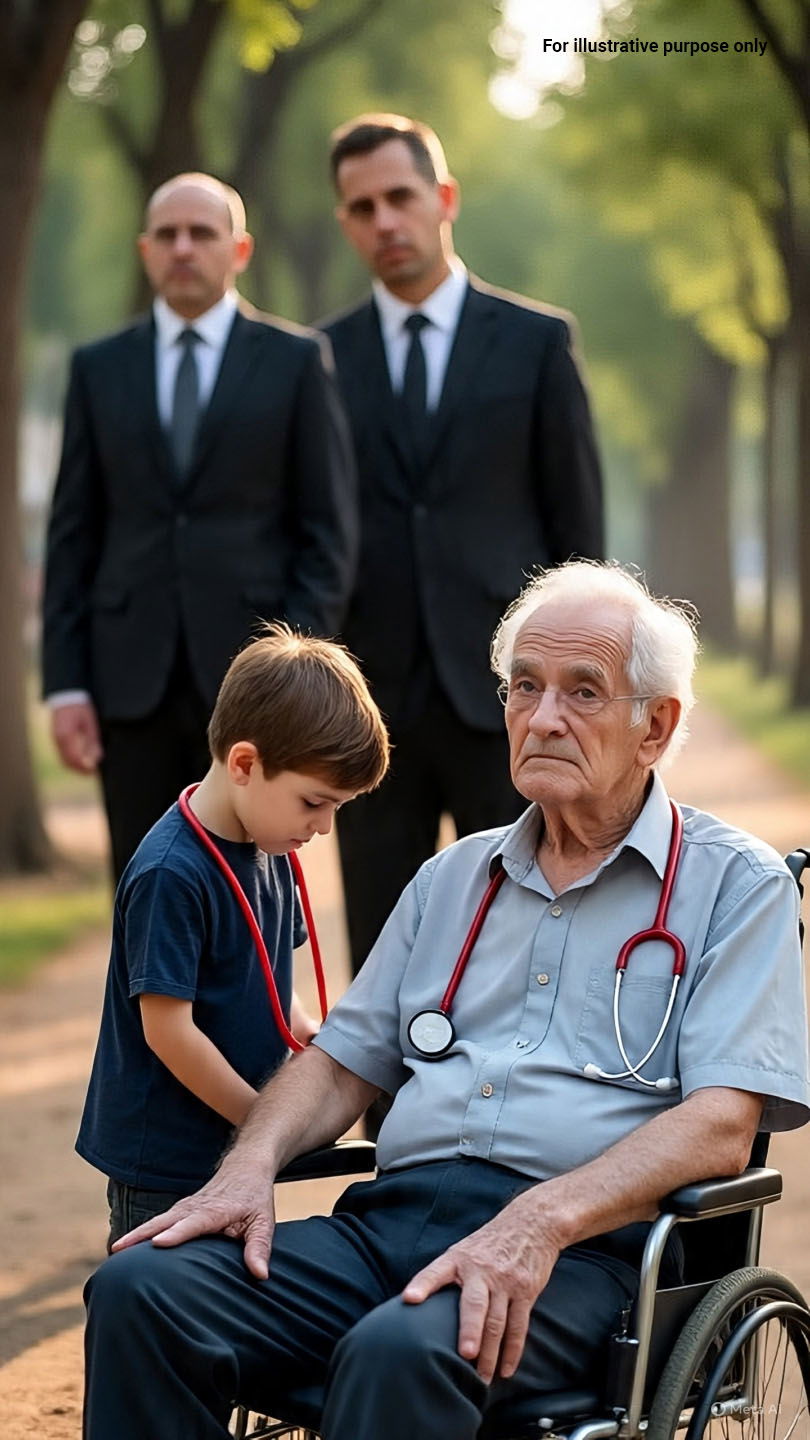
“I knew you’d come,” he said.
“Why did you do it?” Alexander’s voice cracked.
“Because you were alone,” the boy replied. “And one person isn’t a sentence. Sometimes… one person is a miracle.”
Alexander didn’t mention the check. Didn’t speak of deals. He stepped forward and said softly, “Now it’s your turn.”
He had thought he knew value—of people, money, time.
But that night, walking cracked floors with a bowl of soup, he realized—he’d never understood the cost of shame.
At first, he simply came. Quiet. Watching.
He brought food. Medicine. Sometimes just silence.
No one made him leave. But no one welcomed him either. He was respected—from a distance. Too clean. Too polished.
He felt it in every glance. No one trusted him yet. And he didn’t fight that.
The first time he mopped the floor, he felt its every crack. His legs shook. Arms burned. He said nothing.
Luke handed him a rag. Quietly. Watched.
Everything changed one stormy night. Water dripped onto a child’s mattress. Mary, Luke’s grandmother, tried to cover it with a blanket.
Without a word, Alexander took off his coat, climbed onto the windowsill, and braced a board to stop the leak.
“You’ll fall,” she warned.
“I already have. There’s nowhere lower,” he replied.
When he stepped down—soaked, filthy—the kids laughed with him, not near him.
That night, he slept on an old mattress in the hall. No pillow. Just a blanket. And peace.
In the morning, Mary brought tea. No words. Just a cup.
He belonged now.
Luke didn’t cheer. Didn’t hug. Just nodded.
“You always looked down on us,” Alexander once said.
“And what would that change?” Luke shrugged. “It wouldn’t bring back our house. Or Grandpa.”
“I wanted you to see it.”
And he had.
Now, Alexander saw more than rubble—he saw the aftermath.
What used to be statistics on a page—“Thirty-two homes demolished”—had once sounded like logistics, not heartbreak. But now, those homes were faces. Families. People sleeping in hallways. Wearing shoes with holes. Teaching children to read in drafty classrooms.
Each night, Alexander brought something new: warm clothes, flashlights, gloves, a portable generator. No assistants. No press. Just him.
The more he gave, the more he realized—this wasn’t about charity. It was redemption.
One night, Luke asked, “Why don’t you just buy everything again? Like before?”
“Because before, I built with paper,” Alexander replied. “Now I build with my hands. And only now do I understand the true worth of a brick.”
Luke studied him. “There’s something different in your eyes.”
“What is it?”
“Life.”
That night, they played cards. Alexander lost—but laughed. A real laugh. His first in years.
The next day, he returned with a blueprint.
“What is it?” Mary asked.
“A plan,” he said. “I want to rebuild the houses. Start with the two near the park. Then the school. Then the whole neighborhood.”
“No skyscrapers. Just homes. For people.”
Mary looked at him carefully.
“People don’t want palaces. They want the promise of stability. You took that from them. Now you want to give it back?”
“I do,” he said.
He understood that rebuilding wouldn’t erase the past. But maybe—just maybe—it could make peace with it.
That evening, Luke sat by the window scribbling in a notebook. Alexander approached.
“What are you working on?”
“A list. Of those who still need help. The sick. The lonely. I want to find them.”
“You’re still a child,” Alexander said gently.
“But not clueless,” Luke replied.
So Alexander made a list of his own—starting with the people he owed.
Starting with himself.
Then came a morning filled with dread.
No footsteps. No tea boiling. No Mary.
Luke was the first to notice. He knocked on her door—then opened it.
She was lying on her side, face pale, breath shallow. Her lips were dry. Skin dull.
“Water,” she whispered.
Luke rushed to get it, hands trembling. She took a sip. Barely. Then closed her eyes again.
Alexander was in the basement when he heard.
His heart didn’t seize from fear—but something deeper.
Love.
“Did anyone call a doctor?” he asked.
“Probably her kidneys,” someone murmured. “But we don’t have a car. Or money.”
“We do,” Alexander said. “We’re going. Now.”
He drove. Luke sat in the back, holding Mary’s hand.
“You’ll be okay,” he whispered. “I’ll do for you what I did for him.”
At the hospital, tests confirmed the worst.
“Her left kidney has failed. The right’s not far behind,” the doctor explained. “She needs a transplant. Immediately.”
“I’ll pay,” Alexander offered.
“It’s not about the money. We need a donor. Fast.”
Luke froze. His eyes welled up, but the tears didn’t fall. He stared down at his hands—the ones that had once healed.
“Why can’t I help now?” he whispered.
Alexander sat beside him. “Because you’re not a god, Luke. You’re a boy. You gave me hope. But this—this is biology.”
He paused. “Maybe it’s my turn now.”
Tests confirmed Alexander was a match.
“You’re not young,” the doctor cautioned. “You’ll only have one kidney. It’s risky.”
“I’m sure,” he said.
Before the surgery, Luke asked, “Why are you doing this?”
Alexander met his gaze.
“So you don’t lose what I lost. Someone who loves you—no matter what. Without asking for anything in return.”
“This isn’t repayment. It’s what matters.”
The operation was a success.
Mary woke. Smiled at Luke. Kissed his palms.
“I knew you were close,” she whispered.
Luke didn’t correct her. She already knew.
Alexander, weak but at peace, rested quietly.
Luke handed him an envelope.
“What’s this?”
“A check. One million dollars. You gave it to me. I’m tearing it up.”
He ripped it in half. Let it fall.
“Why?”
“Because you can’t buy real acts. What you did—you don’t pay for that. You say thank you.”
Alexander smiled—genuinely this time.
There would be pain ahead. But now, there was purpose.
Three months later, he was out there digging trenches for new water lines.
A nurse called out, “Careful! Don’t overdo it!”
He laughed. “I gave a kidney. My arms will survive.”
He was thinner. Slower. Grayer. But every step he took had meaning.
The old school was changing. Rising.
The Mary Institute.
A haven. A school. Not just for knowledge—but for hope.
Alexander worked alongside everyone else. Carrying supplies. Painting. Repairing lights.
He wasn’t “Mr. Harrington” anymore. He was Uncle Alexander.
He handed out candy. Told stories. Laughed.
“Were you really a billionaire?” a boy asked.
“I was,” he smiled. “Now I’m something better—a person.”
He sold his mansion. Bought a small apartment nearby. Cleaned it himself. Cooked his own meals.
Luke had grown. Glasses. Notebooks. Dreams.
He was studying to be a doctor—paid for, of course, by Alexander.
At the Institute’s opening ceremony, Luke stood before a crowd.
“I once pretended to be a doctor,” he said. “Told someone I could heal him. I didn’t know if I could. But I believed.”
He looked out over the crowd.
“And he healed me. Not my body. But through what he chose to do.”
He spoke of redemption—not bought, but built.
“With hands. With choices. With love.”
“I want to help others the way I was helped.”
In the front row, Alexander sat in simple clothes. His eyes shimmered. Luke stepped down and hugged him.
“You’ll always be the one who saved me,” he whispered.
There was nothing more to say.
And finally—back in the same park.
Alexander sat beneath the sycamore tree. Children played doctor nearby. Luke stood watching over them.
A little girl ran up.
“Uncle Alexander, have you been to the doctor?”
He smiled. “Yes. The best one.”
“Who?”
“The one who healed not the body—but the soul.”
He closed his eyes. Inhaled summer.
Laughter. Wind. Warmth.
Once, he had everything.
Now—he had what mattered.
Legacy isn’t found in your bank account. It’s found in the love you leave behind— In those who carry your light forward.

